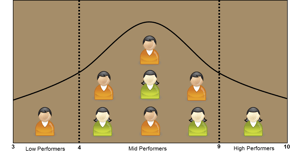The Real Reason Sales Role Play Fails—and How AI Role Play Fixes It
Yesterday, I hosted a live sales training call with a client’s sales team.

Many sales organizations have invested more time, money and effort over the past few years training their sales managers to improve their sales coaching skills then they did in the previous twenty-five. This makes perfect sense when you consider a recent report conducted by the Sales Executive Council shows that no other productivity investment comes close to improving sales performance than sales coaching.
But not all sales reps who receive sales coaching show improvement. In fact, research conducted by Harvard Business Review shows that coaching is almost worthless when sales managers target the wrong reps.
Conventional wisdom tells most sales managers to focus their sales coaching efforts on their low performers because they feel they have the most to gain, or the most upside. And few managers can resist the allure of playing the role of "expert" and sharing their "old war stories" in which they pass along their wisdom to their low performers. But this is NOT time well spent. Instead, sales managers and recruiting managers should be focused on coaching and developing their core performers.
This blog post is about sales coaching targeting your core performers. I'm going to share with you the reasons for why sales managers should invest the bulk of their sales coaching time coaching their core performers.
What is a Core Performer?
All sales teams and the performance of the sales team fall into a bell curve. To the far right of the bell curve are your high performers. This group makes up 20% of your entire sales team. These are your salespeople who achieve 80% of sales quota and higher. To the far left is your low performers. This group makes up another 20% of your entire  sales team. These are your sales reps who are really struggling, often achieving no more than 50% of quota attainment. In the middle of the bell curve are your core performers or mid performers. This group makes up 60% of your entire salesforce. This group is achieving between 60 percent and 79 percent sales quota attainment. When it comes to sales coaching, targeting your core performers will give you the best bang for your buck.
sales team. These are your sales reps who are really struggling, often achieving no more than 50% of quota attainment. In the middle of the bell curve are your core performers or mid performers. This group makes up 60% of your entire salesforce. This group is achieving between 60 percent and 79 percent sales quota attainment. When it comes to sales coaching, targeting your core performers will give you the best bang for your buck.
To Maximize Coaching Results, Target Your Core Performers
You’d think that coaching your low sales performers would deliver the biggest return because they have the most to gain. The reality for these reps and recruiters however is they're less likely to be low performers who can improve, and more likely to be bad hires and a bad fit for the role altogether. No sales coaching in the world can fix that.
Likewise, the opportunity to improve performance with your top performers-your top 20%- is much smaller. Imagine being Tom Brady's personal coach. How do you make the Greatest Of All Time (GOAT) even better? You absolutely can, but the overall opportunity to improve his (or any top performer) skill set is much smaller and very precise. The impact of the small minuscule improvements a coach can make with a top performer often pale in comparison with the impact they can have with a core performer. Improving the sales effectiveness of your core performers will have the biggest impact on your top line and bottom line.
The real payoff from good sales coaching lies among your middle 60% — your core performers. According to a study conducted by CSO Insights, sales coaching can improve performance by up to 19%. In fact, even just small, modest improvements in the quality of the coaching these core performers receive can result in a 6 percent to 8 percent increase in performance across 60% of your sales force. That right there is the difference between hitting or missing sales quota. If you're a manager, you need to ask yourself, how can you structure your sales coaching to increase performance by six to eight percent?
But it is not just how you structure your sales coaching and dedicating the necessary time to sales coaching. Who you coach is just as important as how you coach including your sales coaching activities. Data from Harvard Business Review also suggests that organizations should shift the majority of their coaching focus away from low and top performers and instead focus on the core 60%.
Despite the research, I have found that this approach to sales coaching doesn’t sit well with many IT staffing sales leaders. Sales leaders argue that coaching should be delivered in an egalitarian way. These sales managers are quick to point to their own success turning around low performers. While you can turn some low performers into top performers, it is not likely to be repeatable, and the effort to turn a low performer into a high performer requires the sales manager to burn a lot of coaching calories for very little payoff. Not only that, the average sales rep only stays with their organization for 14 months. For these reasons sales managers need to be careful about who they coach. I've found that the sales manager's time is best spent focused on coaching core performers.
How does coaching work in your IT staffing organization? Is it democratic, targeted, or just non-existent? What are some the challenges your organization faces regarding sales coaching? Download our free ebook and learn how to create a coaching culture.

Yesterday, I hosted a live sales training call with a client’s sales team.

1 min read
Most staffing firms don’t struggle to scale because their teams aren’t working hard. They struggle because they don’t have a real go-to-market...

In my previous post, How to Prevent Unexpected Contract Terminations, I shared how systemizing consultant and client check-ins at key milestones...